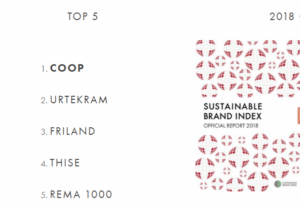News
Coop is Denmark’s most sustainable brand
This article is more than 7 years old.
46 percent of Danes recognise supermarket chain’s green efforts

Coop has worked hard for its green image (photo: Sustainable Brand Index)
According to the 2018 Sustainable Brand Index (SBI), the supermarket chain Coop is the most sustainable company operating in Denmark.
The index (here in English), which is based on consumer opinion, ranked the owners of Irma, Fakta and SuperBrugsen ahead of the pack, followed by last year’s winners Urtekram, Friland, Thise and Rema 1000. Toy giant Lego, Super Brugsen, Irma, Tesla and Kvickly completed the top 10.
“Coop has for a long time actively worked with some of the most important sustainability questions, both in terms of group level and in its chains. And that has really brought results,” said Erik Elvingsson Hedén, the founder of Sustainable Brand Index.
According to SBI, 46 percent of Danes think Coop works hard within the environment and climate arena, while 43 percent said the chain performed well when addressing social questions like diversity and working conditions.
READ MORE: Lego launches first sustainable bricks
H&M woes
The sustainability queries most pertinent to the Danish consumers were organics, food waste and healthy products.
The company that boosted its sustainable image the most since last year was energy provider Ørsted (formerly DONG), which increased its green brand by 15 percent. Conversely, the company which suffered the biggest drop was H&M – which was in the news for burning discarded clothing.
Other notables in the index included Arla (11), Ikea (14), Carlsberg (26), Danish Crown (40), Georg Jensen (76), Pandora (126) and YouSee (147).










































